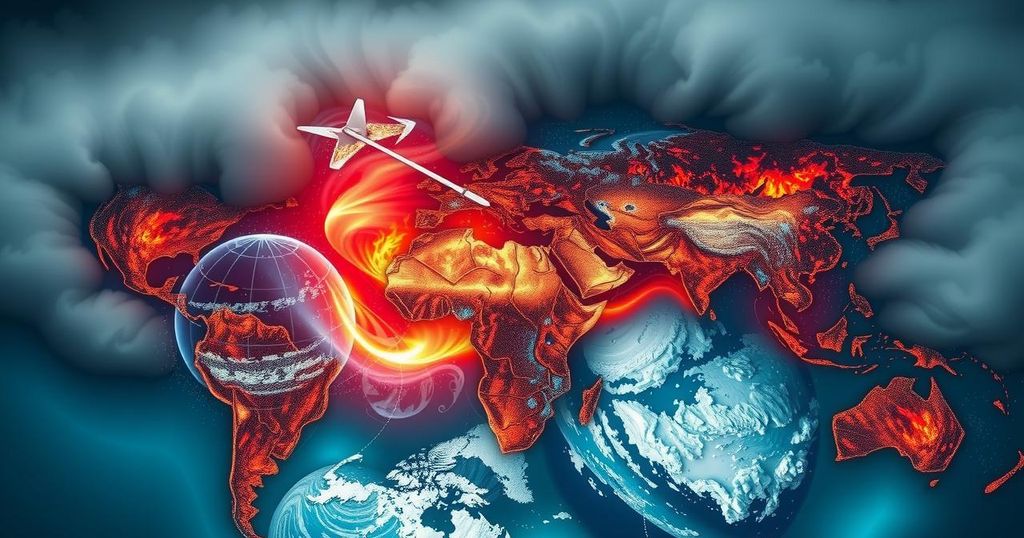Year-End Reflection 2024: The Escalating Impact of Climate Change
The year 2024 experienced heightened climate extremes, following a tumultuous 2023 marked by unprecedented heat and severe weather, contradicting expectations for milder conditions. Disparities in rainfall and drought were pronounced, leading to significant human displacement and loss. While some regions showcased the beauty of nature, climate-driven disasters continued to pose severe threats globally, with millions lacking access to clean water.
The year 2024 witnessed an exacerbation of climatic extremes, following a tumultuous 2023 where historical heat records were recorded, and an array of severe weather events battered numerous nations worldwide. Contrary to expectations that the diminishing El Niño phenomenon would yield a milder 2024, conditions instead proved dire, with populations from Mexico to Pakistan suffering harrowing heat waves. In numerous regions, such as Uruguay and Brazil, relentless rainfall prompted catastrophic flooding, displacing many residents, though many managed to return and reconstruct their communities.
This year, the disparity between excessive rainfall and extensive drought became glaringly evident as climate change continued to disrupt traditional weather patterns. For instance, the Sahara Desert in Morocco saw unusual water pooling amidst sand dunes, while the Amazon rainforest experienced unprecedented drought conditions. These extremes demonstrated the vital yet destructive role of water, contributing to loss of life and property. Disturbing imagery from various global locations, including students in India navigating floodwaters using ropes, highlighted the urgent crisis at hand.
Across the globe, severe storms unleashed violent winds and torrential rains, leaving behind devastation reminiscent of a military assault. Many countries reported terrifying scenes of destruction, where homes appeared ravaged, and streets were buried in debris. The United Nations reported that over two billion individuals still lack access to safely managed drinking water, underlining an enduring humanitarian crisis amidst these environmental challenges.
As temperatures began to decline with the onset of winter in the Northern Hemisphere, there were contrasting scenes of natural beauty juxtaposed against the backdrop of climate-induced catastrophes. Although the cold offered temporary respite from heat, the ever-present threat of climate-related disasters loomed large, including wildfires occurring even in winter months. Meanwhile, locations like Churchill, Manitoba, showcased nature’s splendor, attracting visitors to observe polar bears in their natural habitat amidst the climatic turmoil.
In summary, as 2024 drew to a close, it became clear that the ramifications of climate change were pervasive and significant, with humanity caught in a relentless cycle of weather extremes. The visual and tangible repercussions of this crisis demanded immediate and substantial attention as nations grappled with the reality of our changing planet.
The article addresses the profound effects of climate change that have manifested throughout 2024, highlighting the increased climate variability and frequency of natural disasters. It discusses regional disparities in weather patterns, such as extreme heat in some areas juxtaposed with excessive flooding or drought in others. This situation is further compounded by the failures of infrastructure and the ongoing global crisis regarding access to potable water. As such, the piece underscores the urgent need for collective action and adaptive strategies to confront these pressing environmental challenges.
In conclusion, the year 2024 served as a stark reminder of the escalating consequences of climate change, characterized by an unpredictable climate and severe weather events affecting millions globally. While some regions coped with excessive rainfall and flooding, others faced arid conditions and drought. With water crises affecting over two billion individuals worldwide, it is imperative for governments and communities to implement strategies aimed at mitigating climate change impacts, ensuring sustainable water management, and enhancing resilience against future environmental challenges.
Original Source: www.indiatvnews.com




Post Comment